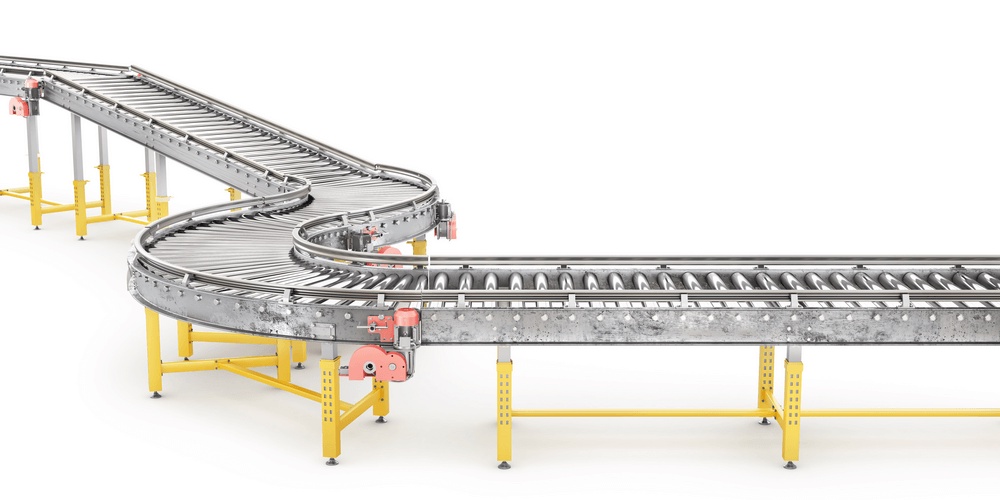Conveyor systems are an integral part of modern industrial operations, providing a reliable and efficient method of transporting materials and products throughout various stages of production, manufacturing, and distribution. Understanding the different types of conveyor systems, their applications across industries, and the key considerations when implementing them is crucial for optimizing workflow, enhancing productivity, and reducing manual labor. This comprehensive blog aims to provide a detailed overview of conveyor systems, covering their types, applications, and important factors to consider during selection and implementation.
Types of Conveyor Systems:
- Belt Conveyors: Belt conveyors consist of a continuous loop of belts that move materials from one point to another. They are versatile, cost-effective, and widely used in industries such as mining, agriculture, and manufacturing.
- Roller Conveyors: Roller conveyors use a series of rollers to transport goods. They are commonly found in warehouses, distribution centers, and assembly lines, facilitating the smooth and efficient movement of objects.
- Screw Conveyors: Screw conveyors utilize a rotating helical screw inside a tube to transport bulk materials. They are often used in industries such as food processing, agriculture, and wastewater treatment.
- Chain Conveyors: Chain conveyors employ chains to move products along the conveyor path. They are suitable for heavy-duty applications and commonly used in automotive manufacturing, bottling plants, and other industries.
- Pneumatic Conveyors: Pneumatic conveyors transport materials using air pressure through a pipeline system. They are ideal for handling lightweight materials or powders in industries such as pharmaceuticals and chemical processing.
Applications of Conveyor Systems:
Conveyor systems find extensive applications across various industries:
- Manufacturing: Conveyor systems play a crucial role in assembly lines, enabling the efficient movement of components between workstations and optimizing production processes.
- Warehousing and Distribution: Conveyor systems streamline the transportation of goods within warehouses and distribution centers, facilitating order fulfillment and enhancing logistics operations.
- Mining and Quarrying: Conveyor systems are used to transport bulk materials, such as coal, ore, and aggregates, from mines or quarries to processing plants or storage areas.
- Food and Beverage: Conveyor systems are widely utilized in the food and beverage industry for sorting, packaging, material handling, and other processes, ensuring safe and efficient processing.
- Retail and E-commerce: Conveyor systems are essential in retail and e-commerce fulfillment centers, automating the movement of packages, parcels, and products to expedite order processing and shipment.
- Airport Baggage Handling: Conveyor systems play a vital role in airports, facilitating the efficient movement of luggage from check-in counters to baggage claim areas.
- Pharmaceutical and Healthcare: Conveyor systems are utilized in pharmaceutical manufacturing, laboratories, and healthcare facilities for tasks such as material handling, packaging, and distribution.
- Automotive Industry: Conveyor systems are integral to automotive manufacturing, enabling the transportation of components during assembly, painting, and final production stages.
Considerations when Implementing Conveyor Systems:
When implementing conveyor systems, several crucial factors should be taken into account:
- System Design: The design of the conveyor system should align with the specific needs of the operation. Factors such as material type, volume, weight, required speed, and facility layout should be considered. Customization options should be explored to optimize system performance.
- Safety Measures: Safety should be a top priority when implementing conveyor systems. Proper guards, emergency stop buttons, safety sensors, and interlocking mechanisms should be incorporated to prevent accidents and ensure worker protection.
- Maintenance and Serviceability: Easy access for maintenance and repairs is essential for minimizing downtime. Select conveyor systems with simple maintenance requirements and readily available spare parts to ensure efficient operation.
- Integration with Existing Infrastructure: Compatibility with existing equipment, such as automated machinery or robotics, should be considered to achieve seamless integration and optimize workflow efficiency.
- Scalability and Flexibility: Select conveyor systems that can accommodate future growth and adapt to changing production needs. Modular conveyor systems offer scalability and flexibility, allowing for easy expansion or reconfiguration.
- Energy Efficiency: Opt for conveyor systems that prioritize energy efficiency. Technologies such as variable speed drives, efficient motors, and optimized control systems help reduce operational costs and minimize environmental impact.
- Reliability and Durability: Choose conveyor systems from reputable manufacturers known for their reliable and durable products. Long-lasting components and robust construction ensure minimal downtime and maintenance costs.
- Noise and Environmental Considerations: Evaluate the noise levels produced by the conveyor system and implement necessary measures to minimize noise pollution. Additionally, consider environmental factors such as dust control and material containment to comply with regulations and maintain a clean working environment.
Conclusion:
Understanding conveyor systems, their types, applications, and considerations for implementation is crucial for businesses seeking to optimize material handling, streamline operations, and improve productivity. Belt conveyors, roller conveyors, screw conveyors, chain conveyors, and pneumatic conveyors are just a few examples of the wide range of systems available. The applications of conveyor systems span various industries, including manufacturing, warehousing, mining, food and beverage, retail, and more. Implementing conveyor systems requires careful consideration of system design, safety measures, maintenance requirements, integration with existing infrastructure, scalability, energy efficiency, reliability, and durability. By selecting and implementing the appropriate conveyor system tailored to specific needs, businesses can enhance efficiency, reduce labor costs, minimize errors, and improve overall operational performance. A well-designed and properly implemented conveyor system can truly be a valuable asset, contributing to increased productivity, profitability, and success in today's competitive industrial landscape.


No comments yet